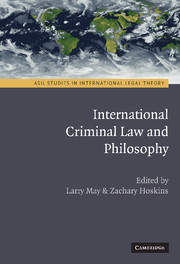Book contents
- Frontmatter
- Contents
- List of Contributors
- Introduction
- PART ONE SOVEREIGNTY AND UNIVERSAL JURISDICTION
- PART TWO CULTURE, GROUPS, AND CORPORATIONS
- PART THREE JUSTICE AND INTERNATIONAL CRIMINAL PROSECUTIONS
- 7 Postwar Environmental Damage: A Study in Jus Post Bellum
- 8 On State Self-Defense and Guantánamo Bay
- 9 Politicizing Human Rights (Using International Law)
- PART FOUR PUNISHMENT AND RECONCILIATION
- Index
- References
7 - Postwar Environmental Damage: A Study in Jus Post Bellum
Published online by Cambridge University Press: 19 January 2010
- Frontmatter
- Contents
- List of Contributors
- Introduction
- PART ONE SOVEREIGNTY AND UNIVERSAL JURISDICTION
- PART TWO CULTURE, GROUPS, AND CORPORATIONS
- PART THREE JUSTICE AND INTERNATIONAL CRIMINAL PROSECUTIONS
- 7 Postwar Environmental Damage: A Study in Jus Post Bellum
- 8 On State Self-Defense and Guantánamo Bay
- 9 Politicizing Human Rights (Using International Law)
- PART FOUR PUNISHMENT AND RECONCILIATION
- Index
- References
Summary
They made a desert, and called it peace.
– Tacitus, Agricola 30The doctrine of just war, as developed by Cicero, Augustine, Aquinas, Grotius, and others, falls into two parts: jus ad bellum and jus in bello. The first part indicates when wars should be waged; the second part describes how wars should be waged. Both the ad bellum and in bello parts of the doctrine lapse when the war ends. In my book, The Ethics of War and Peace, I suggested that the just war doctrine should be extended to conditions after the war is over: This is the category of jus post bellum.
In this chapter, I propose a new principle of jus post bellum, that participants in war have an affirmative obligation to restore the environment damaged by their military operations. Consider the following example. On April 18, 1999, during operations directed by the North Atlantic Treaty Organization (NATO) against Serbia, NATO (i.e., U.S.) bombers attacked an oil refinery, a nitrogen-processing plant, a petrochemical plant, and other industrial facilities at Pančevo (near Belgrade), resulting in widespread contamination with toxic chemicals of the Pančevo area and the Danube River. The suggested principle of jus post bellum implies that NATO countries in general, and the United States in particular, have a legal obligation to clean up these chemicals and restore the environment to its prewar condition.
Given current international and U.S. law, residents of Pančevo have little legal recourse.
- Type
- Chapter
- Information
- International Criminal Law and Philosophy , pp. 141 - 152Publisher: Cambridge University PressPrint publication year: 2009



